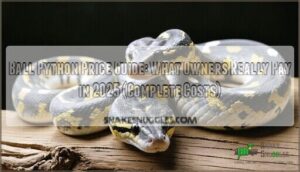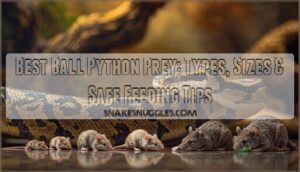This site is supported by our readers. We may earn a commission, at no cost to you, if you purchase through links.

A basic "normal" morph might cost $40-$100 from a pet store or breeder, while rare morphs with unique colors or patterns can easily run $500 to $5,000—or even more for high-end genetics.
Adoption fees at rescues are often lower, but availability can be limited.
Don’t forget costs for essentials like a tank, heating, and lighting, which start around $200.
Monthly expenses, including food and care, add up too.
Understanding these factors helps you budget smartly for your new scaly friend’s long-term care.
Table Of Contents
- Key Takeaways
- Ball Python Purchase Costs
- Initial Setup Expenses
- Monthly Ownership Costs
- Factors Affecting Prices
- Ongoing Care Expenses
- Frequently Asked Questions (FAQs)
- How much do ball pythons sell for?
- What is the most sought after ball python?
- What is the most expensive ball python color?
- How much does a ball python cost?
- How much does an albino ball python cost?
- How much does a ball python morph cost?
- How much does it cost to feed a ball python?
- How much does a cinnamon ball python cost?
- How old should a ball python be to sell?
- Why are ball pythons so cheap?
- Conclusion
Key Takeaways
- You’ll find ball python prices range from around $40 for basic morphs to thousands of dollars for rare variations, influenced by factors like rarity, breeder reputation, and genetics.
- Setting up your snake’s habitat will cost $200–$300, including essentials like a tank, heating, lighting, and decor.
- Monthly care expenses, including food and maintenance, typically cost $20–$50, depending on your snake’s size and feeding habits.
- Adopting from rescues can save you money, with fees ranging from $25–$150, while supporting snake rescue efforts and providing a home for a pet in need of monthly care.
Ball Python Purchase Costs
You’ll find ball python prices vary widely in 2025, ranging from $40 for standard morphs to over $500 for rare genetic variations.
Your purchase costs will depend on factors like morph type, breeder reputation, and whether you buy from adoption centers, private breeders, pet stores, or online retailers.
Adoption Fees
Rescue organizations offer ball pythons at adoption fees ranging from $25 to $150, depending on the morph, age, and rarity.
Adopting a ball python supports snake rescue efforts while offering an affordable way to welcome a unique morph into your home.
You’ll find these costs substantially lower than retail prices, often at half or less.
- Adoption benefits include supporting snake rescue work while saving money
- Shelter variations exist, with some offering discounts to educational facilities
- Fee justification includes covering the snake’s housing, heating, and feeding costs to support the snake rescue work.
Breeder Prices
Breeder prices for ball pythons can vary widely based on reputation, lineage quality, breeding ethics, and morphs exclusivity.
Research is key, as python pricing depends on many factors. Here’s a quick overview:
| Morph Type | Price Range ($) | Influences |
|---|---|---|
| Normal Phase | 42.95 – 225 | Common, easy to source |
| Rare Morphs | 199.95 – 3,000+ | Rarity, demand |
| Multi-Gene Morphs | 395 – 455 | Complex genetics, exclusivity |
| Hatchlings | 40 – 50 | Size, general availability |
Explore breeder options carefully, considering the factors that influence the prices of ball pythons, such as lineage quality and breeding ethics.
Pet Store Costs
Pet store ball python prices often reflect markup pricing, adding costs compared to breeders.
Chain vs. local shops differ—chains may offer beginner packages, while locals prioritize health guarantees.
A snake price guide reveals costs range from $42.95 to $479, depending on morphs.
Be cautious of impulse buys; always make certain your purchase aligns with your reptile cost guide and care plan.
Basic morphs at pet stores typically cost $25 to $100, but genetics impact pricing.
Online Retailer Prices
When buying from online retailers, you’ll notice ball python prices vary substantially.
Expect competitive pricing and added perks like shipping guarantees and retail discounts.
Use this snake price guide:
- Morph availability affects python morph prices.
- Price comparison helps you find reptile pricing within budget.
- Shipping costs often influence selections.
- Retailer reputation guarantees quality and live arrival guarantees.
Rare Morphs and High-End Costs
Rare ball python morphs can cost a fortune due to morph demand, breeder exclusivity, and genetic complexity.
Rare ball python morphs captivate collectors with their stunning visuals, exclusivity, and investment potential, making them prized treasures in the reptile world.
Popular options, like Axanthic Pied or Sunset, are pricey but offer investment potential.
Ethical concerns about breeding also affect rare python prices.
Use the table below for insight into morph market value and python price trends:
| Morph | Price Range | Rarity | Demand Level | Investment Potential |
|---|---|---|---|---|
| Sunset | $4,000-$10,000 | High | Very High | Excellent |
| Axanthic Pied | $1,500-$5,000 | Medium | High | Good |
| Tri-Stripe | $3,000-$7,000 | High | Moderate | Good |
| Albino Black Pastel | $300-$350 | Low | Moderate | Fair |
| Enchi Leo YB Pied | $1,000-$3,500 | Medium | High | Good |
Normal Morphs and Standard Costs
For those exploring affordable options, Wild Type and Common Morphs are great beginner snakes.
Base Genes like Pastel or Mojave typically range from $40 to $160, reflecting steady python price trends.
Here’s what you’ll find:
- Wild Type ball pythons start at $43.
- Base Genes hover around $120 for hatchlings.
- Common Morphs offer quality below $150.
Initial Setup Expenses
Getting your ball python’s habitat set up isn’t complicated, but it does require a bit of planning.
From the tank to the heating equipment, each piece plays a vital role in keeping your new pet healthy and comfortable.
Tank and Enclosure Costs
A quality enclosure is essential for ball pythons. Prices depend on size, material, and design. Expect $100-$300 for reptile enclosures, with larger setups costing more.
Used enclosures and custom builds can save money but check for damage. Add $50-$150 for accessories like hides and bowls.
Essential tank components include a water bowl and thermometer. Focus on durable materials ensuring easy reptile enclosure setup and maintaining consistent temperatures with a thermometer.
Heating and Lighting Costs
Heating and lighting costs vary based on equipment.
Radiant heat panels are efficient reptile heating solutions, with options like 40W to 220W panels for temperature maintenance.
Ceramic heaters cost $20–$30, while thermostats for reptile temperature control add $20–$50.
Energy consumption remains low, around $5 monthly.
Prioritize safety measures, including avoiding overheating, for proper reptile enclosure heating and ideal care, ensuring efficient solutions and low energy costs.
UVB Lighting and Accessories
Proper lighting enhances your ball python’s health and basking behavior.
UVB benefits include better vitamin D3 synthesis and overall wellness.
Reliable lighting types, like T5 HO fluorescent tubes, cost $25-$50. Pair these with reptile accessories like timers ($15-$30) for convenience.
Verify the fixture in your reptile habitat has reflectors for efficiency and complements your reptile enclosure design seamlessly.
For maximum UVB exposure, replace bulbs to maintain lighting effectiveness every 6-12 months.
Substrate and Decor Expenses
Substrate types matter for your ball python’s comfort and humidity control.
Popular options include cypress mulch and aspen shavings. Add reptile hideouts and decor for enrichment value and aesthetic appeal.
Verify decor safety by avoiding sharp edges. Hiding spots help your python feel secure in its habitat.
A well-chosen substrate supports proper humidity in the reptile enclosure. Many keepers source appropriate bedding options for their python, considering humidity control.
Essential Accessories and Tools
When setting up your ball python’s home, essential accessories keep everything on track.
You’ll need:
- Hiding Boxes – Offer security and comfort for your snake.
- Heating Panels and Thermostat Control – Regulate consistent warmth using modern reptile heating methods.
- Cleaning Supplies – Maintain hygiene with reptile-specific cleaning tools.
These reptile supplies simplify care, making your pet feel safe and healthy.
Providing secure hiding places is vital for their well-being.
Monthly Ownership Costs
Owning a ball python means budgeting for recurring monthly expenses like food, health care, and maintaining their environment.
These costs can vary depending on factors like snake size, health needs, and the type of setup you choose.
Food and Feeding Expenses
Feeding your ball python is straightforward but requires planning.
You’ll choose between frozen rodents or live feeding, depending on preferences. Small frozen mice or fresh rats for larger snakes work best. Match the prey size to your python’s width.
Plan for feeding frequency, usually weekly. Supplement costs add up, especially if raising food yourself or exploring rodent breeding for convenience.
It’s also key to follow feeding frequency guidelines based on the snake’s age.
Health Care and Veterinary Costs
Healthcare for ball pythons can include routine vet visits for preventative care, specialist consultations for genetic disorders, and even exotic vet emergency visits.
Initial vet checkups cost $50 to $150, while annual wellness exams range from $40 to $150.
Pet insurance helps offset costs, but be prepared for occasional pricey treatments like surgeries or euthanasia costs if needed.
Medications and Supplements
Keeping your ball python healthy might involve medications like antibiotics during infections or deworming protocols.
Probiotic benefits support digestion, while calcium sources and vitamin supplements help maintain bone strength.
An exotic vet can guide proper usage, and routine reptile care lowers risks of costly vet visits, so stay consistent with their needs to guarantee a happy, thriving snake with strong bone strength from calcium sources.
Pet Insurance Options
Medications can get pricey, so pet insurance is worth considering for your ball python.
Policies vary—compare providers for the best coverage of vet visits, emergencies, or prescribed medications.
Look into premium costs and exclusions explained upfront. A simple claim process makes emergencies less stressful.
Pet insurance coverage guarantees unexpected bills don’t catch you off guard. Always review policy coverage carefully.
Environment Maintenance Costs
Keeping your ball python’s habitat comfortable means regular enclosure upgrades and investing in cleaning supplies, a humidity gauge, and a reliable temperature gauge.
Reptile enclosure maintenance also involves humidity control, heating pads, and temperature monitoring to guarantee stability.
Automation systems can help reduce effort but add cost, and consistent care keeps their reptile enclosure temperature perfect and supports their well-being, through effective use of a temperature gauge.
Factors Affecting Prices
Regarding ball python prices, several key factors play a role in what you’ll pay. Genetics, rarity, size, and even breeder reputation all influence the final cost.
Genetics and Morphs
The beauty of ball python morphs lies in their diverse genetics, offering unique combinations of colors and patterns.
Python genetics influence everything from appearance to price. Understanding how morph identification and gene interactions work can help you appreciate the value behind these snakes.
- Traits depend on genetic mutations.
- Breeding strategies create rare morphs.
- Visual traits increase demand.
- Popular snake morphs cost more.
- Unique python morphs stand out, due to their unique combinations of colors and patterns, which are a result of genetic mutations.
Rarity and Demand
Rarity drives demand, making some ball python morphs substantially more expensive.
Limited availability of unique patterns or colors fuels collector interest, pushing prices higher. Morph popularity often shifts with market trends, influencing snake morph values.
Rare morphs command steep price premiums in the ball python market, as enthusiasts prize these extraordinary snakes for their beauty and exclusivity.
Prices can range widely, with some rare morphs costing thousands, driven by collector interest.
Size and Age
A ball python’s size and age play a big role in its cost.
Hatchlings are typically less expensive, while juveniles and adults (especially those with breeding potential) command higher prices.
- Hatchling prices start low, great for beginners.
- Juvenile costs often increase due to growth impact and care investments.
- Adult value climbs with proven breeding potential or rare morphs.
Coloration and Patterns
Color intensity and unique markings play a huge role in the value of ball python morphs.
Pattern genetics determine intricate python patterns, with some morph variants offering striking visual appeal.
A python morph guide or ball python morph list shows how morph identification influences prices.
Collectors often pay more for rare combinations that stand out among standard morphs, and unique markings can significantly impact the value.
Breeding Ethics and Sourcing
When choosing breeders, prioritize ethics to avoid issues down the road.
Look for:
- Responsibly bred ball python morphs to guarantee Genetic Health.
- Breeder transparency about breeding practices and animal health.
- Captive bred over wild-caught pythons, reducing Wild-Caught Impacts.
- Traces of python breeding demand, balancing quality with Morph Demand.
- Ethical reptile breeders committed to sustainable practices.
Ongoing Care Expenses
Caring for a ball python involves routine expenses that keep your pet healthy and comfortable.
From vet visits to maintaining an ideal environment, it’s essential to plan for ongoing costs throughout their long lifespan.
Routine Veterinary Costs
Routine vet visits keep your ball python healthy.
Annual checkups typically cost $50–$100 and help spot issues early.
Fecal exams, priced around $15–$40, check for parasites.
Preventing common issues like scale rot or respiratory infections saves money long-term.
Not all vets treat reptiles, so compare exotic pet prices or use a snake value estimator to plan costs.
| Service | Frequency | Average Cost | Purpose |
|---|---|---|---|
| Annual Checkups | Once a year | $50–$100 | General health monitoring |
| Fecal Exams | As needed | $15–$40 | Parasite detection |
| Parasite Prevention | As recommended | $30–$50 | Health maintenance |
| Specialized Testing | Varies | Varies | Detect advanced issues like infections |
The table outlines the average cost and purpose of various services, including annual checkups and fecal exams.
This information can help you plan and budget for your ball python’s healthcare needs, ensuring you provide the best possible care for your pet.
Emergency Medical Expenses
Emergency medical expenses can be steep for ball pythons and other exotic pets. Sudden illnesses or injuries often require immediate care.
Here’s what to expect:
- Emergency vet visits: $75–$150
- Critical care or oxygen therapy: $100+
- Unforeseen surgeries: $200–$800
- Infection treatments: $50–$200
- Pet insurance coverage: $10–$40 monthly
Prepare for emergencies to manage rising exotic pet prices.
Chronic Health Issues
Chronic health issues in ball pythons, like respiratory infections, scale rot, or genetic disorders, can be tough on you and your pet.
Regular python care helps prevent these problems. Good python husbandry minimizes risks of inclusion body disease or parasites.
Staying proactive with snake care, including vet checkups, guarantees a healthy, happy python while easing long-term reptile care responsibilities, ensuring a positive experience with reptile care.
Pain and Discomfort
Your ball python’s well-being depends on spotting issues like Scale Rot, Mouth Rot, or Respiratory Infections early.
Pain and discomfort also arise from stuck sheds or mite infestations, so prompt care matters.
Neglecting these could multiply vet bills—brushing up on a python value guide or reptile price analysis helps you balance morph prices with maintenance costs for a healthier snake, considering the overall reptile price.
Long-Term Care and Responsibility
Caring for a python is a lifelong commitment. Their 20-30 year lifespan means consistency in handling, enrichment, and care.
Ethical considerations like proper housing and diet guarantee their health and happiness. Understand their behavior for safe interactions. Regular health checks matter too.
To ensure the well-being of your python, maintain:
- A balanced python diet for longevity.
- Proper handling techniques.
- Enrichment needs such as hides or climbing space.
Frequently Asked Questions (FAQs)
How much do ball pythons sell for?
Imagine walking into a reptile haven—ball python prices range from $42 for basic morphs to over $500 for rarer types.
Factors like size, sex, breeder reputation, and morph rarity greatly influence costs.
What is the most sought after ball python?
The most sought-after ball pythons are often rare and visually striking morphs, like the Banana Pied or Blue Eyed Leucistic.
Demand depends on rarity, vibrant patterns, and unique colors that excite collectors and breeders alike.
What is the most expensive ball python color?
Like rare gems, the most expensive ball python morphs, such as the Scaleless and Stranger variations, can cost tens of thousands of dollars.
Their value comes from extreme rarity and stunning, unheard-of patterns.
How much does a ball python cost?
Ball python prices range from $25 to over $500, depending on factors like morph rarity, age, and breeder reputation.
Common morphs cost less, while unique patterns or colors can command substantially higher prices.
How much does an albino ball python cost?
Albino ball pythons typically cost between $199 and $350, depending on factors like size, age, and breeder reputation.
Sales can lower prices, so shopping around on reputable platforms can help you find the best deal.
How much does a ball python morph cost?
Ball python morph prices vary widely, ranging from $89 for common varieties to $449 or more for rarer ones.
Factors like morph rarity, breeder reputation, and demand heavily influence the cost you’ll pay.
How much does it cost to feed a ball python?
Feeding a ball python costs about $5 to $30 per month.
Younger snakes eat small mice, while adults need larger prey like rats.
Frozen feeders are more affordable than live ones, saving you money.
How much does a cinnamon ball python cost?
Cinnamon ball pythons typically cost between $100 and $300, depending on their age, sex, and breeder.
Prices may increase if the snake has added genes or unique markings, so compare options before buying.
How old should a ball python be to sell?
Think of it like waiting for fruit to ripen—ball pythons are best sold at 3-6 months old.
By then, they’ve established eating routines, shed properly, and grown strong enough for a new home.
Why are ball pythons so cheap?
Ball pythons can be cheap because they’re widely bred, with thousands of morphs available.
High reproduction rates and competitive markets drive prices down, especially for common morphs, making them accessible to new and experienced keepers alike.
Conclusion
Planning your ball python purchase means prioritizing prices, practicality, and preparation.
This ball python price guide highlights the range of costs—from affordable normal morphs to rare, high-end options—and explains essential expenses like enclosures, heating, and monthly care.
By understanding these factors, you’re prepared to budget wisely and create the perfect environment for your new pet, which is crucial for responsible ownership.
Whether you adopt or buy, investing in their well-being guarantees a happy, healthy snake, and this investment starts with informed financial planning.
- https://www.zenhabitats.com/blogs/reptile-care-sheets-resources/ball-python-complete-lighting-and-heating-guide?srsltid=AfmBOopPWk12uHyd3yrBPvH5nLfz4dNTkm4NhKDfEpwVEajOD3XInmOz
- https://reptifiles.com/ball-python-care-guide/ball-python-humidity-temperatures/
- https://www.happydragons.com/buying-guides/ball-python-deluxe-buying-guide
- https://www.zillarules.com/information/care-sheets/ball-python
- https://www.reddit.com/r/ballpython/comments/117hn28/do_ball_pythons_needbenefit_from_daily_uvb_or/



















